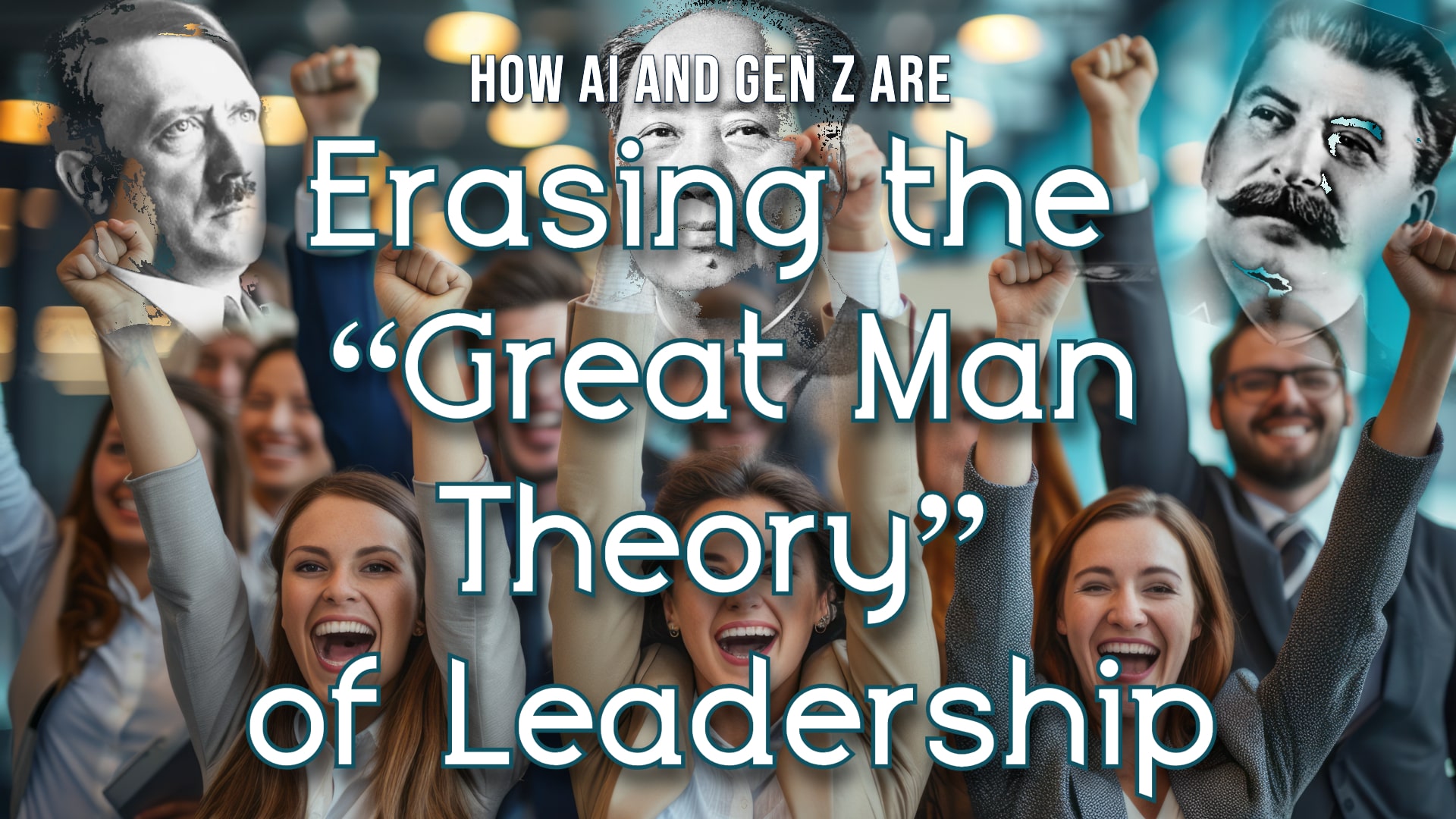We are all navigating the overwhelming daily pressures that include the rise of authoritarian leadership and the exponential expansion of AI in our own way. With the increase of both phenomena, it is too easy to tell ourselves that “there’s nothing we can do” and psychologically step aside and abdicate personal responsibility.
All it will cost us is our freedom!
How often have you found yourself justifying inaction due to overwhelming change?
It doesn’t matter what generation we were born into. We all know it’s time for a new era of leaders to rise up, not from the shadows of some mythical predestined greatness but through the transformative power of curiosity, empathy, courage, creativity, and innovation.
Are you ready to be part of this new leadership paradigm?
This new generation of leaders will guide a dynamic workforce toward a future where technology enhances human creativity through connection and community.
As we step into a future dominated by artificial intelligence (AI), we are witnessing the ascendancy of Millennials and Generation Z in the workplace. These generations are reevaluating traditional leadership theories. The Great Man and Transformational Leadership theories offer contrasting insights into effective and ineffective leadership during rapid technological changes.
What leadership qualities do you value most in this AI-driven era?
The Great Man Theory Revisited: Originating in the 19th century, the Great Man Theory advocates that true leaders are born, not made, endowed with inherent qualities that predestine them for leadership.
This theory has been symbolic of hero worship and the cult of personality. The Great Man Theory is personified by authoritarian leaders who present themselves as preordained saviors meant to lead their followers to greatness.
They use language like “only I can.” They present themselves as being a “man of the people” when they are usually at least somewhat privileged. During turbulent times, such leaders often offer oversimplified solutions to complex problems, which resonate with those who crave certainty and direction.
 However, the Great Man theory has been criticized significantly, especially from modern neuroscientific perspectives, which argue that leadership capabilities are not innate but can be cultivated through education and experience.
However, the Great Man theory has been criticized significantly, especially from modern neuroscientific perspectives, which argue that leadership capabilities are not innate but can be cultivated through education and experience.
Do you believe that effective leadership is a trait you’re born with, or can it be developed?
Neuroscientists have pinpointed areas like the prefrontal cortex, crucial for decision-making and emotional regulation, highlighting that these regions are malleable and can be developed over time.
How can we apply this neuroscientific knowledge to develop better leadership skills in ourselves and others?
Psychological Dynamics of Leadership:
We may shake our heads and wonder how followers of an authoritarian leader can’t see through their schemes. If I just described your point of view, you may want to reconsider your position.
Firstly, it doesn’t help, and secondly, cult psychology teaches us that even the most educated among us are susceptible to these kinds of leaders for a multitude of reasons, including childhood trauma and a desire for meaning.
 Reflect on a time when your desire for certainty influenced your decision-making. What did you learn from that experience?
Reflect on a time when your desire for certainty influenced your decision-making. What did you learn from that experience?
However, intellectual arrogance is one of the most dangerous reasons that even the smartest among us can end up following, supporting, and even arguing for an authoritarian leader.
Highly educated people may develop a sense of intellectual superiority, leading them to believe they are too intelligent to be deceived by cults or cults of personality. This intellectual arrogance blinds them to warning signs. Even when it’s glaring, that arrogance stops them from admitting they were wrong.
How can we guard against intellectual arrogance in our leadership practices?
The Appeal of the Great Man Theory
Psychological and social psychological research has shed light on why people may still gravitate towards authoritarian figures, a phenomenon that aligns with the Great Man Theory.
 Key factors include a longing for certainty, a need for security, and an inherent tendency to obey authority. Such dynamics are crucial in understanding the follower-leader relationship in contexts where authoritarian leadership is prevalent.
Key factors include a longing for certainty, a need for security, and an inherent tendency to obey authority. Such dynamics are crucial in understanding the follower-leader relationship in contexts where authoritarian leadership is prevalent.
In what ways can understanding these psychological dynamics help us foster healthier leadership dynamics?
Transformational Leadership:
A Modern Approach Transformational Leadership Theory contrasts sharply with the Great Man Theory by emphasizing the potential for personal growth and change within leadership roles.
Transformational leadership does not deny that some people seem to be born leaders or that some degree of that “natural leadership” may be in some part nature or nurture. No, Transformational Leadership Theory emphasizes that greatness is not simply the destiny of a few but that each of us can and must pick up the mantel of greatness and grow into it to serve a greater good.
Are you ready to embrace Transformational Leadership and create a positive impact in your community or workplace?
Transformational Leadership Theory resonates deeply with Millennials and Gen-Z, who prioritize meaningful work, personal growth, and organizational values that mirror their values and are especially receptive to this theory.
 How can we leverage the principles of Transformational Leadership to meet the needs and aspirations of younger generations in the workforce?
How can we leverage the principles of Transformational Leadership to meet the needs and aspirations of younger generations in the workforce?
Transformational leaders are characterized by their ability to inspire and elevate those around them, encouraging collaboration, innovation, and a shared purpose. This approach enhances individual and organizational performance and aligns with the psychological needs of today’s workforce, fostering a collaborative and empowering environment.
Neuroscientific Foundations of Transformational Leadership:
Recent neuroscience studies have illuminated the underpinnings of Transformational Leadership, revealing that such leaders often exhibit increased neural activity in areas associated with empathy, emotional intelligence, and social cognition.
These capabilities enable leaders to effectively connect with, understand, motivate, and inspire their followers. Neuroimaging studies also suggest that transformational leaders engage brain regions linked to creativity and cognitive flexibility, crucial traits for adapting to the fast-evolving technological landscape, which is vital in the new world of artificial intelligence.
Leadership in the Age of AI
Which leadership style is considered the best?
Transformational and Servant Leadership are often considered more effective, particularly in constantly changing environments where innovation and adaptability are crucial. Leaders of these styles are more likely to inspire loyalty while encouraging growth.
 As AI reshapes the workplace, automating routine tasks and altering traditional roles, the human aspect of leadership becomes more critical than ever. The capacity to foster creativity, emotional intelligence, and adaptability is increasingly vital. Transformational leadership, focusing on continuous learning and innovation, is particularly suited to this new era. It empowers leaders to guide their teams through the complexities of modern challenges, particularly in sectors where AI is a transformative force.
As AI reshapes the workplace, automating routine tasks and altering traditional roles, the human aspect of leadership becomes more critical than ever. The capacity to foster creativity, emotional intelligence, and adaptability is increasingly vital. Transformational leadership, focusing on continuous learning and innovation, is particularly suited to this new era. It empowers leaders to guide their teams through the complexities of modern challenges, particularly in sectors where AI is a transformative force.
Conclusion:
While the Great Man Theory offers a historical perspective on leadership rooted in innate ability and charisma, it must be revised in today’s dynamic and interconnected world.
Transformational Leadership Theory provides a more flexible and realistic framework for developing leaders who can navigate the complexities of the 21st-century workplace, making it a more suitable model for an era marked by rapid technological advancement and changing workforce dynamics.
As we continue to explore AI’s potential and integrate these advanced technologies into every aspect of our lives, the leaders of tomorrow will need to be increasingly adaptable, empathetic, collaborative, human-centric, and perpetually open to learning—qualities at the heart of transformational leadership.
 To best integrate the learning from what I’ve shared here, I suggest that you take action and apply these three practical tips:
To best integrate the learning from what I’ve shared here, I suggest that you take action and apply these three practical tips:
- Embrace Continuous Learning:
- Actively Seek Cross-Disciplinary Knowledge: Do not limit yourself to a single field. Engage with diverse disciplines to develop broad competencies. You might take courses on topics outside your expertise, attend workshops, or work on cross-functional teams.
- Foster Empathy and Emotional Intelligence:
- Practice Active Listening and Empathy in Daily Interactions: Emotional intelligence is vital for leadership in the AI era. Actively listening to others, understanding their perspectives, and responding compassionately. Practice these skills in supportive environments by joining groups or peer circles.
- Encourage Innovation and Creativity:
- Implement Regular Brainstorming Sessions: Ensure a creative and innovative environment. Your team needs regular brainstorming sessions where all ideas are welcomed without judgment. Problem-solving techniques such as design thinking can help. Adapting to technological advancements also drives and engages your team.
Adopting a more transformational and inclusive leadership style can help you better navigate the challenges of modern workforces.
To evolve beyond the “Great Man” leadership model, personal and professional development strategies must be incorporated.
These tips will help you become a more effective leader who is responsive to your team and the demands of the workplace today.




